617 Search Results for tell me about it
November 14, 2018
by Carole Zangari -

As AAC practitioners, we sometimes lose sight of how our prognostications impact the individuals we serve. In today’s featured video Rob Rummel-Hudson provides some perspective on this important issue. Many thanks to Mr. Rummel-Hudson, the AAC RERC, and the AAC team at Penn State for making this video available. Direct Link to Video – https://aac-learning-center.psu.edu/2018/10/14/the-folly-of-fortune-telling/
November 12, 2018
by Carole Zangari -
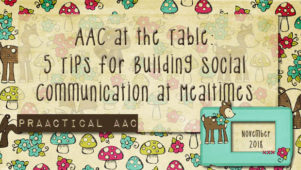
Think back on some of the meals that you’ve shared with others recently. What did people talk about? In most cases, there’s a lot more that ‘Pass the peas,’ ‘What’s for dessert?’, and ‘Can I go now?’ Mealtimes are social experiences in many cultures and it can take some work to ensure that our AAC learners can take part. Here are some ideas for supporting the development of social communication during shared meals. Build a routine that includes social communication: AAC learning takes time and lots of prAACtice. We can support the march to AAC proficiency by incorporating specific kinds of social exchanges into our mealtimes so that AAC learners know what the expect and have practice opportunities for this skill set at mealtime. Some examples: Sharing Time (i.e.., everyone shares something that happened to them that was funny/interesting/memorable), Question of the Day (e.g., “What’s your favorite __?” “Where’s the... [Read More...]
October 18, 2018
by Carole Zangari -
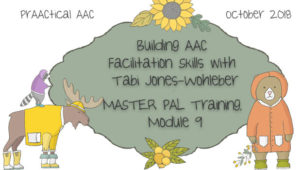
We continue our AAC partner training series, authored by SLP Tabi Jones-Wohleber, with a 60-minute session on presuming potential. In addition to her work with the AT Team for Frederick County Public Schools in Maryland, Tabi serves young children and their families at West Virginia Birth to Three programs. You can see the first 8 modules here. ::::::::::::::::::::::::::::::::::::::::::::::::::::::::::::::::::::::::::::::::::::::::::::::::::::: Model as a MASTER PAL Module 9: Presume Potential Presuming potential is a belief system that influences our words and actions both consciously and unconsciously. As such it cannot be overstated that our words and actions shape the nature and trajectory of opportunities for learning, communicating and engaging for those with whom we interact who use AAC. This module showcases a parent perspective, and utilizes many video examples to invite participants into an honest and reflective conversation on the need to shed assumptions about where an individual’s learning will “max out”. It... [Read More...]
July 12, 2018
by Carole Zangari -
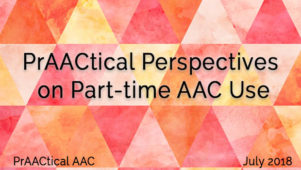
Can AAC be of benefit to people who speak? Today, we welcome Alyssa Hillary Zisk, an Autistic PhD student in the Interdisciplinary Neuroscience Program at the University of Rhode Island, who shares their experiences with part-time AAC use. :::::::::::::::::::::::::::::::::::::::::::::::::::::::::::: Think about a person who uses AAC. I’m probably not the person you thought of. For one thing, I’m an autistic adult, and the AAC research I’ve seen relating to autism is generally about kids. Services are generally aimed at kids too. For another, my AAC use isn’t the result of having consulted with a specialist who evaluated me and suggested possible strategies. Oh, and my speech sounds pretty fluent, in two languages — when I can talk. That’s not always, and there is the reason I use AAC. I’ve always had somewhat intermittent speech – that is, I can talk, but only sometimes. For this reason, I use a variety of... [Read More...]
July 9, 2018
by Carole Zangari -
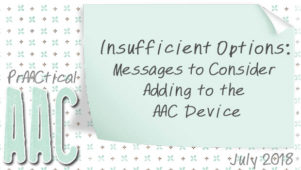
How would it feel to be really hungry but allergic to everything on the menu at the only place in town that is still serving food? Can you imagine finding comfortable shoes that you were dying to buy to wear with your navy suit except that they only had fuschia and neon yellow in your size? Have you ever been frustrated by filling out a form that gave only choices for racial groups that you don’t identify with? Let’s face it: It’s incredibly, maddeningly, and impossibly frustrating when our options are overly limited or the choices don’t include things that we want or need. We feel trapped. It’s frustrating, demeaning, and downright infuriating to be constrained in those ways. And yet, most people who use AAC face that situation every day. Their language is limited by the options available to them in their SGDs, communication books, or AAC apps. Until... [Read More...]
June 11, 2018
by Carole Zangari -
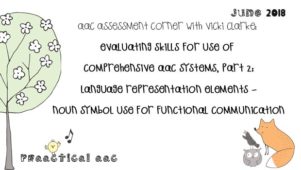
Vicki Clarke, CEO of Dynamic Therapy Associates and Director of DTA Schools, is back with another wonderful edition of AAC Assessment Corner. In addition to their clinic, Vicki and her team support school districts in AAC evaluation, equipment procurement, and implementation for individual students in the academic environment. DTA Schools also supports district-wide AAC implementation through the Classroom Communication Goals Project, training, and supporting all team members in classroom AAC implementation. In today’s post, Vicki shares her thoughts on how we can look at the use of AAC symbols for nouns as part of our evaluations for comprehensive AAC systems. You can view her previous contributions to the AAC Assessment Corner here. :::::::::::::::::::::::::::::::::::::::::::::::::::::::::::::::::::::::: Evaluating Skills For Use of Comprehensive AAC Systems, Part 2: Language Representation Elements – Noun Symbol Use for Functional Communication It was a crazy, busy month full of evaluations, trainings, and report writing. I’ve spent a lot of time with... [Read More...]
May 21, 2018
by Carole Zangari -
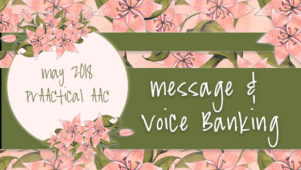
People with declining speech abilities may wish to preserve some aspects of their speech through voice banking, message banking, and/or digital legacies. These are strategies used to digitally record speech by people with degenerative conditions, such as ALS/MND, for later use once their speech abilities decline. You can learn more about each strategy here. Voice Banking Voice banking is a strategy for creating a synthetic version of someone’s voice for later use on speech generating devices (SGD). It involves recording hundreds or thousands of sentences so that the computer can sample the person’s vocal qualities in different linguistic contexts and use that information to create a synthetic voice modeled after the person’s own speech. Options for Voice Banking include: Model Talker CereVoice Me VocalID My Own Voice Message Banking Message banking is a strategy for creating a pool of pre-recorded messages using a person’s natural speech while it is... [Read More...]
March 8, 2018
by Carole Zangari -
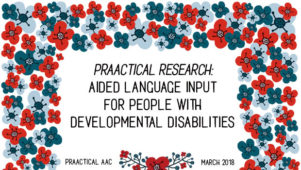
We’re pleased to welcome back Dr. Kathy Howery for another analysis of an AAC research article. Kathy is based in Alberta, Canada, and has worked in the field of AT and special education for over three decades. In the past year, she completed her doctoral studies where she used phenomenological methods to seek to understand the lived experience of speaking with/through a speech generating device. Kathy is currently working as a consultant to schools and school districts across Alberta focusing primarily on children and youth with complex communication needs. ::::::::::::::::::::::::::::::::::::::::::::::::::::::; Allen, A. A., Schlosser, R. W., Brock, K. L., & Shane, H. C. (2017). The effectiveness of aided augmented input techniques for persons with developmental disabilities: A systematic review. Augmentative and Alternative Communication, 33, 149-159. What this Article is All About (The Focus of the Research) This article presents the results of a systematic review of the research into what the authors refer... [Read More...]
October 19, 2017
by Carole Zangari -
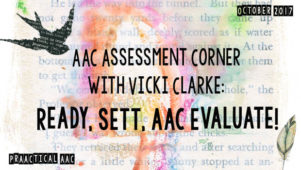
She’s bAACk! We couldn’t be happier to have another guest post on AAC assessment practices from Vicki Clarke of Dynamic Therapy Associates. In today’s post, she shares her tips and experiences for applying the SETT Framework to AAC assessment. If you are looking for information about how AACtual SLPs conduct their evaluations, Vicki’s posts are just what you need. You can view her previous contributions to the AAC Assessment Corner here. :::::::::::::::::::::::::::::::::::::::::::::::::::::::::::::::::::::::::::::::::::: Ready, SETT, AAC Evaluate! Last week I had the pleasure of joining the AAC After Work online conference hosted by Yapp Guru University. Jenna Coyer and I presented a session chatting about AAC assessment in emergent communicators. As we have worked to define our process for evaluation, we found ourselves repeatedly returning to the same approach our Assistive Technology teams use—the SETT Framework. The SETT Framework was developed by Joy Zabala as a process for making decisions about... [Read More...]
June 29, 2017
by Carole Zangari -
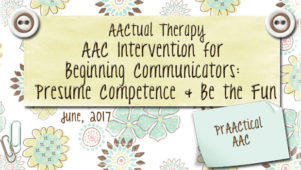
Today we learn from a veteran AAC SLP, Lindsey Paden Cargill, who has been working in the field of SLP for 12 years and is passionate about service provision and research in the area of AAC for individuals with developmental disabilities. In addition to her caseload, she is also the Therapy Manager at a private therapy and education center in Columbus, Ohio called Bridgeway Academy. Lindsey is currently collaborating with The Ohio State University on several AAC-related research studies including an immersive AAC classroom and a parent-training course. AAC Intervention Strategies for Beginning Communicators: Presume Competence and Be the Fun In the last ten years providing energetic, creative and data-driven AAC language therapy has become my passion… or maybe obsession. My mission statement is for anyone interacting with a new AAC user to “presume competence and be the fun.” To accomplish my goals I have to prioritize several things: providing a... [Read More...]









